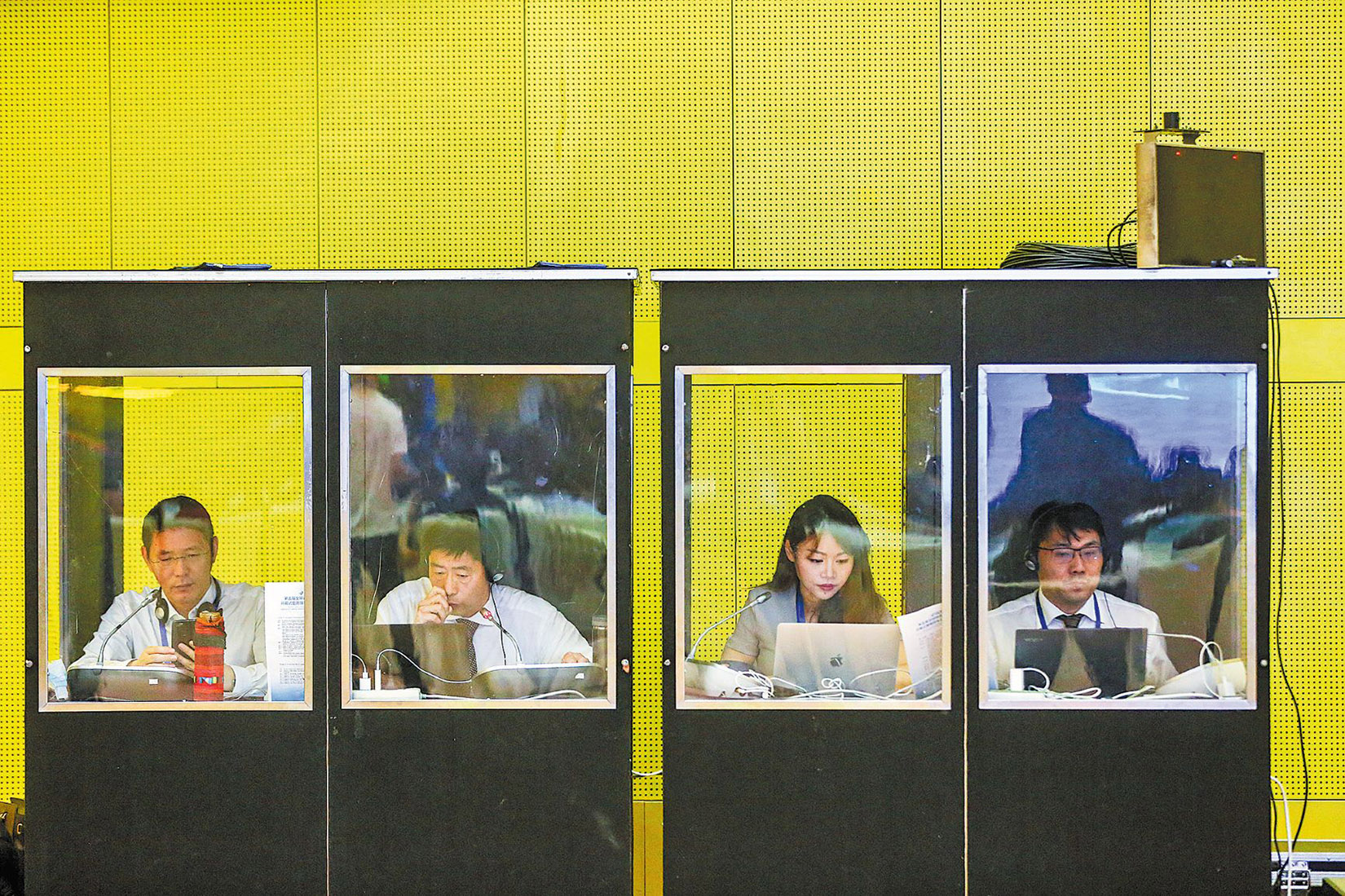Universities address fresh challenge to make discipline more relevant to students, industry

Once boasting abundant opportunities to land promising careers, foreign language majors are now confronting profound change as artificial intelligence disrupts traditional career paths and universities implement sweeping reforms.
In 2023, the University of Science and Technology of China in Hefei, Anhui province, was among the first top-tier universities in China to discontinue its English major. In 2024, the University of International Business and Economics and Beijing Language and Culture University announced the suspension of enrollment for several master's programs in less commonly taught languages, including Japanese translation and Italian interpretation.
In May 2024, the University of Jinan in Shandong province announced that it had halted enrollment in nine undergraduate majors, including Korean and German. That same month, Shenyang Aerospace University in Liaoning province listed 10 majors paused for enrollment, including English.
READ MORE: Key schools to launch low-altitude economy major
According to the university undergraduate major approval catalog covering 2018-2022 released by the Ministry of Education, a total of 28 foreign language-related majors were discontinued by 109 universities. Among these, 26 universities discontinued Japanese, 21 discontinued English, and 10 discontinued Korean.

Golden era over
Language majors enjoyed a golden era from 1999 to 2010, fueled by China's World Trade Organization accession in December 2001.
During this period, universities offering foreign language programs surged from 200 to over 600, representing a 200 percent increase, according to education news portal EOL.
By 2010, the total number of English majors in colleges nationwide reached 850,000, with employment rates consistently exceeding 90 percent. In 2005, English graduates commanded starting salaries 15 percent above the national undergraduate average.
This trajectory, however, has reversed dramatically in recent years. AI translation tools now achieve over 95 percent accuracy at 1 percent the cost of human services, and have seized 40 percent of the general translation market. The shift has eliminated demand for basic "human translation machines "while creating niches for "translation managers" proficient in AI collaboration, EOL said.
Employment statistics reflect the crisis. The 2023 employment rate for language majors fell to 76.8 percent, 5.6 percentage points below the national undergraduate average, according to a report by Beijing-based education consultancy MyCOS. Only 52 percent of language majors secured jobs related to their major, forcing nearly half to switch fields. Satisfaction with such majors plummeted from 78 percent in 2010 to 67 percent in 2023, the report said.
Traditional employment sectors contracted sharply. International trade and business hires declined from 28 percent in 2010 to 18 percent in 2023, while translation and localization roles halved from 15 percent to 8 percent during the period. Education and tutoring dropped from 25 percent to 22 percent, with K12 English training experiencing particularly severe contraction, MyCOS said.
A new graduate of Beijing Foreign Studies University, who asked to be identified by her surname Zeng, said she has witnessed the decline of English majors at one of the country's best foreign language higher-learning institutions as the minimum entry scores for its flagship English program have dropped over the years.

For Zeng, the trade-off between pragmatism and the nuances and beauty of the English language is a daily concern. She said: "When I tell people I studied English, their first question is always about AI — 'why bother learning English when AI can do translation' they ask?"
"What we study is the aesthetic beauty of language, without which, even with ChatGPT, people cannot tell whether the English written by the AI tool is good or not."
Moreover, when learning English, students also understand the political system of English-speaking countries, critical thinking, and the philosophy of the Western world, which are all useful knowledge to have, she said.
Through intensive reading in English, students are exposed to independent thinking, and concepts such as equality and caring for others, she said.
However, Zeng acknowledge the difficulties English major graduates face in landing jobs in the face of economic headwinds. After experimenting with cross-border e-commerce livestreams and corporate training, she now tutors wealthy Beijing students — work that pays very well but offers no stability.
"I am afraid the difficulty for English graduates to find jobs is that they have not learned the language well enough, and they are not capable of even writing a simple e-mail," she said. "It is something I cannot understand, but it is part of the harsh truth."
She said she still recommends high school graduates learn English at BFSU, which has a great environment and caring and highly capable teachers.
Zhao Xincheng's post-graduation odyssey illustrates the decline of English as a major.
A graduate of Wuhan University in Hubei province, Zhao secured a tutoring position last autumn, only to receive a termination notice in April — two months before his graduation. "No explanation, just 'position eliminated'," he said.
Subsequent multiple interviews yielded nothing. Zhao said he is not inferior to his classmates in terms of language skills, appearance, personality and communication skills. He believes he has been terminated for no good reason and feels frustrated.
Zhao is now preparing to take the civil service exams next year. He said he does not recommend English as a career choice for students. If they like to study languages, they should have skills in other fields to increase their employment competitiveness, he said.

Broader decline
There is a broader trend of English declining as a major said Wu Peng, dean of Jiangsu University's Overseas Education College.
Since 2022, he has found fewer students inquiring about enrolling in an English major, he said. There are also fewer students with high entrance scores choosing the major, while more English major students are choosing to later switch to engineering, he said.
However, Wu believes the decline is not limited to English as a major, or China alone. It exists in liberal arts majors in almost all countries as well as "less useful" engineering majors, he said.
Wu attributed the waning interest to policy shifts (like the "double reduction" policy reducing K-12 English tutoring jobs), technological disruption (AI handling 80 percent of basic translation), and the discipline's core weakness. Its biggest failing is producing over 100,000 graduates annually who are mainly focused on pure language skills, while market demand now centers on high-end interdisciplinary competence.
Dai Jiangwen, head of the English department at Beijing Jiaotong University, rejected claims that English majors are "declining", arguing that the discipline requires optimization aligned with national needs and the fourth industrial revolution.
She emphasized foreign languages' critical role in safeguarding information sovereignty, developing language technologies like machine translation, and preserving linguistic diversity. Dai stressed the "irreplaceable humanistic attributes" of the discipline in the AI era — fostering emotional intelligence, cultural sensitivity, and critical thinking that AI lacks.

Both professors agreed the core issue is structural. Dai pinpointed outdated curricula, faculty misalignment with industry needs, rigid disciplinary classifications, and obsolete training models. Wu said graduates face intense competition from students in other fields who also possess strong English skills plus specialized knowledge.
Dai strongly recommended English majors include language intelligence programs in their studies, calling it a "direct path" for humanities students to enter the AI industry. She pointed to one program that combines linguistics, AI, data science and cultural studies as an example.
Wu advised current students to urgently build "English plus" skills (for example international law and data science), master technical tools, and target high-growth niche areas like specialized translation services or cross-border e-commerce. He recommended the major only to students with clear interdisciplinary ambitions and international career plans, favoring dual-degree "English plus X" paths.
ALSO READ: Universities right to reduce foreign language seats, start new majors
Wu said while national policies such as the Belt and Road Initiative and reform and opening-up provide long-term demand for English talent, "pure English" ability is devalued.
He stressed the urgent need for "English plus minor languages" or "language plus professional" compound skills, noting there was a deficit of more than 500,000 students who are fluent in English plus languages like Russian or Arabic, adding that current faculty structures are ill-prepared.
Both professors agreed AI will reshape, not replace, language fields. Dai said machines cannot fully replicate human translators' creativity, especially in nuanced communication and cultural adaptation.
Wu predicted AI would automate low-end translation but create new roles like "AI trainers" or "cultural adapters", leading to human-AI collaboration. He emphasized that humanities disciplines, and exploring "what makes us human" fundamentally define the boundaries of AI and other technologies.
He said: "AI will force the humanities to upgrade, not disappear, and create experts who can use AI but understand humans better than AI."
Contact the writer at zoushuo@chinadaily.com.cn


